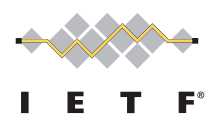
Back مجموعة مهندسي الإنترنت Arabic IETF Azerbaijani IETF Bulgarian ইন্টারনেট ইঞ্জিনিয়ারিং টাস্ক ফোর্স Bengali/Bangla Internet Engineering Task Force Catalan ھێزی ڕاسپاردەی ئەندازیاریی ئینتەرنێت CKB Internet Engineering Task Force Czech The Internet Engineering Task Force Danish Internet Engineering Task Force German IETF Greek
 | |
| Abbreviation | IETF[1] |
|---|---|
| Formation | January 14, 1986[2] |
| Type | |
| Purpose | Creating voluntary standards to maintain and improve the usability and interoperability of the Internet |
Parent organization | Internet Society |
| Website | ietf |
| Internet |
|---|
 |
|
|
| Internet history timeline |
|
Early research and development:
Merging the networks and creating the Internet:
Commercialization, privatization, broader access leads to the modern Internet:
Examples of Internet services:
|
The Internet Engineering Task Force (IETF) is a standards organization for the Internet and is responsible for the technical standards that make up the Internet protocol suite (TCP/IP).[3] It has no formal membership roster or requirements and all its participants are volunteers. Their work is usually funded by employers or other sponsors.
The IETF was initially supported by the federal government of the United States but since 1993 has operated under the auspices of the Internet Society, a non-profit organization with local chapters around the world.
- ^ Jacobsen, O.; Lynch, D. (March 1991). A Glossary of Networking Terms. IETF. p. 7. doi:10.17487/RFC1208. ISSN 2070-1721. RFC 1208.
- ^ Cite error: The named reference
Bradner-January1999was invoked but never defined (see the help page). - ^ "Internet Engineering Task Force (IETF)". RIPE Network Coordination Centre. August 10, 2012. Archived from the original on November 1, 2018. Retrieved August 22, 2018.